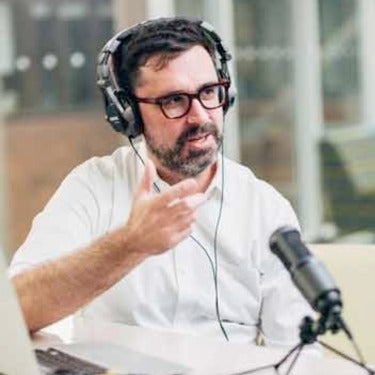
With one glance of comments on YouTube, you might despair at people’s inability to discuss content without resorting to insults or outright hostility.
And one big question you might ask: Is the discourse actually changing anyone’s mind?
Rather than thinking about communication as the transmission of information from one person to another, Professor Robert Danisch says we need to think of communication as a practical art of producing effects on others.
Danisch is a professor of communication, and if there’s one fundamental problem that he is compelled to point out, it’s the misuse of the word itself. Communications — with an s — refers to the technologies used to generate and transmit communication, not the practice itself.
“If you want to get better at communication, the first thing you need do is to stop thinking of it as a transmission. You need to stop saying ‘Did you get it?’”
Instead, communication is more about making meaning, he says. “You make meaning by producing effects on others. So, it’s about how to produce the right kinds of effects to convey your message or ideas.” In fact, he’s making effects on students of communication in the classroom and beyond with a toolbox of learning resources, including his podcast series, Now We’re Talking.
“Once we start to pay close attention to the effect our interpersonal or public communication practice has on another person or audience, then we are in a better position to improve our communication skills.”
Danisch, who is department chair of Communication Arts and director of the Arts First program, is deeply committed to addressing what he sees as a central problem in democracies.
Improving all forms of communication — interpersonal, small group, written, public speaking and leadership — are covered in the series of micro lessons in Danisch’s podcast. Topics range from the basics, “What is communication? And how do I get better at it?”, to public rhetoric, “How to win an election”, to social psychology, “How some communication practices can ruin our relationships”. Or, this timely one: “Why and how to stop invalidating others.”
Along with the podcast, Danisch has produced a video series and, in 2018, he published a book entitled What Effect Have I Had?. As an alternative and complement to more traditional classroom instruction, he says these media provide valuable tools for students (and even alumni, as it turns out) to use when they engage in practical exercises, research assignments, or daily life and work interactions.

Danisch sees particular impact and potential in the podcast format. “Podcasts are a great tool for knowledge mobilization. And the quick production of podcasting allows me to use current events or issues to illustrate communication concepts. The series is proving a great teaching resource.”
In fact, students have co-hosted podcast episodes with Danisch, often using communication examples from their own lives. “Part of the reason I love what I teach is my students can easily find examples of what we’re talking about — in political culture, in their private lives, it’s everywhere. The students are instantly engaged and have five examples of a communication problem or solution.”
Five things to know about effective communication:
- Stop asking, “Did you get it?” and start thinking about how you make meaning by producing effects on others.
- Audience and context are the two most important considerations for effective communication.
- You cannot NOT communicate: you are always producing effects on others, so consider all of the ways in which you are effecting others.
- Worry less about being right, or delivering information; instead, ask questions to build relationships.
- Communication is more than the words: meaning is made through our interactions with others, and not found in the text alone.
![]()
![]()




